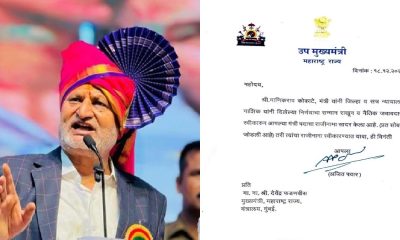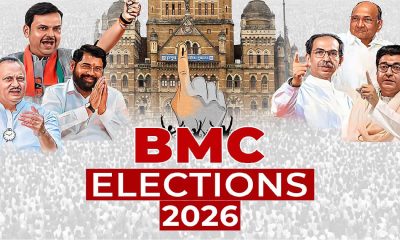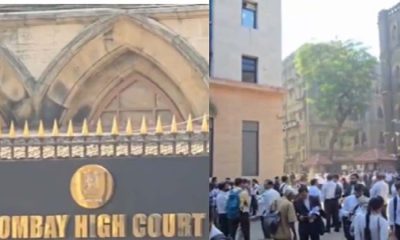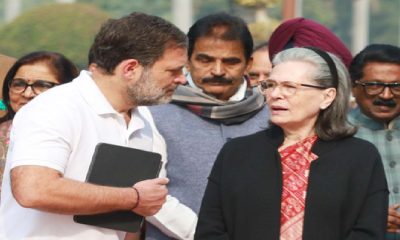National News
For many years after Independence, there was no long term vision in health sector: PM
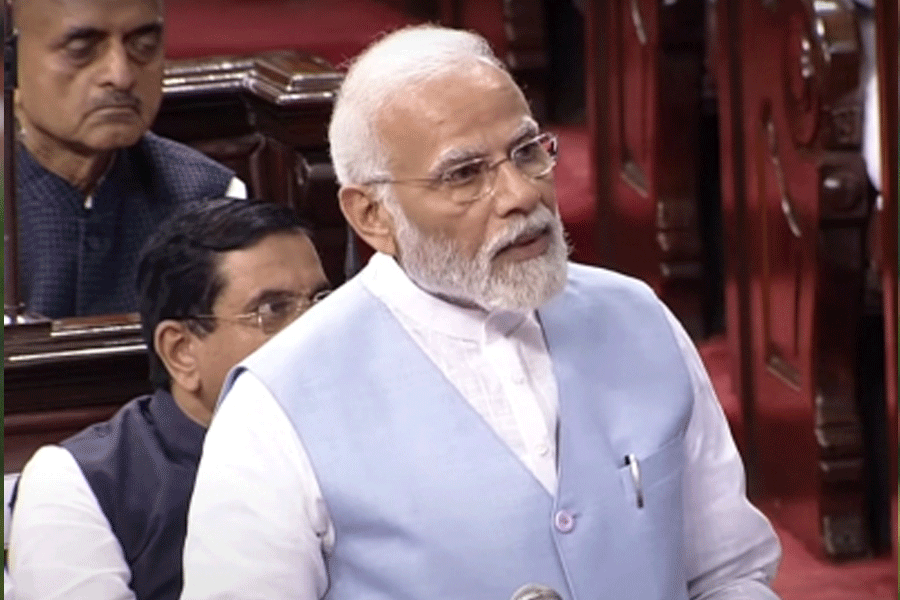
Prime minister Narendra Modi on Monday claimed that for several decades after Independence, there was a lack of an integrated approach and long term vision in the health sector.
“For several decades after Independence, there was a lack of an integrated approach and a long-term vision in health. We have not kept healthcare restricted only to the health ministry, but have emphasised on the whole of the government approach,” he said while addressing a webinar on “Health and Medical Research”.
It has been the endeavour of the Centre, to make medical treatment affordable in India, the Prime Minister added.
“That has been the thought behind providing free medical treatment of upto Rs 5 lakh under the Ayushman Bharat scheme. Under this, approximately Rs 80,000 crore, that would’ve been spent on medical treatments, were saved,” he said further.
For serious diseases, quality and modern health infrastructure in the country is important, the PM said.
Government’s focus is also on ensuring that people get testing facilities near their homes and there are better facilities for first aid, he added.
For this, he said, 1.5 lakh health and wellness centres are being prepared in the country, the prime minister informed.
Referring to the Coronavirus pandemic, the Prime Minister said that it showed that when such a crisis occurs, even developed systems of prosperous nations collapse.
“World is now much more focussed on health. But India’s approach is not restricted to healthcare, we’re also working on ensuring wellness,” he added.
“Corona also taught us that supply chain has become a very important matter. When the pandemic was at its peak, for some countries even life-saving things like medicines, vaccines, and medical devices had become weapons,” the Prime Minister noted.
Reminding the audience that India helped many nations by providing vaccines to them, he said, “That’s why we have kept a vision before the world – ‘One Earth, One Health’ – holistic healthcare for everyone.”
National News
Housing fraud case: Ajit Pawar accepts NCP minister Manikrao Kokate’s resignation, forwards it to CM

Mumbai, Dec 18: Amid a chorus from the opposition, Maharashtra Deputy Chief Minister and NCP chief Ajit Pawar on Thursday accepted the resignation of party minister Manikrao Kokate, against whom an arrest warrant has been issued in a housing fraud case.
Kokate had submitted his resignation to DCM Pawar on Wednesday after a sessions court sentenced him to two years’ imprisonment in the Nashik housing fraud case.
On Wednesday night, Kokate was stripped of his Sports and Minority Affairs portfolios and was retained as a minister without any portfolio.
Kokate is currently undergoing medical examination at Lilavati Hospital after he complained of uneasiness. He has already approached the Bombay High Court seeking relief from the sessions court ruling.
In a post on X, Ajit Pawar said: “Maharashtra Cabinet Minister and my party colleague Shri Manikrao Kokate has submitted his resignation to me following the outcome of the Hon’ble Court’s verdict. In keeping with our party’s long-standing philosophy that the rule of law is supreme and above all individuals, the resignation has been accepted in principle. I have forwarded Shri Kokate’s resignation to the Hon’ble Chief Minister for due consideration and acceptance, in accordance with constitutional procedure.”
He further stated: “Our party has always believed that public life must be guided by constitutional morality, institutional integrity and respect for the judiciary. We stand firmly by the rule of law and will continue to act in a manner that upholds democratic values and public trust.”
Pawar took the decision after holding a meeting lasting over two-and-a-half hours early Thursday morning with party working president Praful Patel and state chief Sunil Tatkare.
Manikrao Kokate is a five-time MLA from the Sinnar constituency in Nashik district and has a history of shifting political loyalties. His membership of the legislature could also be at risk if the High Court upholds the sessions court ruling.
The sessions court upheld his conviction in a case involving the illegal acquisition of government flats through forged documents and sentenced him to two years of imprisonment. Following the verdict, an arrest warrant was issued against Kokate.
He faces imminent arrest unless the High Court grants a stay on the conviction.
Amid these legal developments, Kokate’s health condition deteriorated and he was admitted to Lilavati Hospital in Mumbai. He skipped the weekly cabinet meeting held on Wednesday at Mantralaya.
Kokate’s legal team informed the court that he was admitted to a hospital and sought a four-day stay on the arrest. However, the court rejected the plea, noting that no medical certificate was presented and that Kokate should have been present when the verdict was delivered.
Kokate has moved the Mumbai High Court challenging the sessions court ruling and has sought an urgent hearing and a stay on the sentence.
The High Court is scheduled to hear the matter on Friday.
The case dates back to 1995 and involves the alleged misappropriation of flats reserved under the Chief Minister’s quota. These flats are meant for low-income individuals who do not own property elsewhere.
Manikrao Kokate and his brother Vijay Kokate were accused of submitting fraudulent affidavits and documents to acquire two flats in the Nirman View Apartment in Nashik.
Investigations later revealed that the brothers were also using two additional flats in the same building that had been allotted to other beneficiaries.
Based on an inquiry conducted by the district administration, Vishwanath Patil, then an official of the Urban Land Ceiling (ULC) department, filed a complaint. Subsequently, a fraud case was registered at Sarkarwada Police Station against four individuals, including the Kokate brothers.
The court sentenced them to two years of rigorous imprisonment and imposed a fine of Rs 50,000 each.
Since his induction into the cabinet, Kokate has been embroiled in several controversies.
He was stripped of the Agriculture portfolio after the monsoon session of the state legislature in July, following allegations by NCP-SP legislator Rohit Pawar that Kokate was playing games on his mobile phone during a Legislative Council session. While Kokate denied the allegation, it drew widespread criticism.
He also triggered outrage with controversial remarks on farmers, stating: “Even a beggar does not accept one rupee, but here we provide crop insurance for just one rupee, yet some people try to take undue advantage of it.”
During a municipal election campaign, Kokate had also taken a swipe at coalition partner BJP, calling it a “corrupt party” (batlela paksha) that survives by breaking other parties while sidelining its own workers.
Earlier this year, another NCP minister, Dhananjay Munde, had resigned after his aide Walmik Karad was linked to the murder of Santosh Deshmukh, sarpanch of Massajog village in Beed district.
Mumbai Press Exclusive News
2 MD vendors in Mumbai sentenced to 20 years, accused sentenced due to improvement in police investigation in ANC case

The Mumbai Anti-Narcotics Cell had arrested two drug peddlers in 2017 and recovered drugs from their possession and now the court has sentenced these drug peddlers to 20 years in prison and a fine of Rs 1 lakh. Drug peddlers Praveen Dilip Vaghela and Ramdas Pandurang were arrested by ANC’s Ghatkopar and the MD’s car was also seized during the search of the accused.
Crime
Navi Mumbai Police Seize Drugs Worth Rs 21 Lakh, Nigerian National Arrested

The Navi Mumbai Police have seized drugs worth over Rs 21 lakh, including mephedrone and MDMA, and arrested a Nigerian national in connection with the case, officials said on Wednesday.
The seizure followed a routine police patrol carried out on December 15 along Palm Beach Road. A team noticed a foreign national standing suspiciously near a parked scooter late at night. When the police approached him for questioning, the man abandoned the vehicle and fled the spot, raising further suspicion.
Upon checking the scooter, the police recovered 70 grams of mephedrone powder, estimated to be worth nearly Rs 17 lakh. In addition, 120 MDMA tablets were also found during the initial search, an official release stated.
Following the recovery, police launched a search operation to trace the suspect. He was later arrested from his residence in Koparkhairane. During a subsequent search of the premises, police recovered additional quantities of drugs, including mephedrone powder worth around Rs 4 lakh and 40 purple MDMA tablets.
While the combined value of the seized mephedrone powder has been estimated at over Rs 21 lakh, the police did not specify the market value of the MDMA tablets recovered during the operation.
The accused has been identified as Aniehe Kingsley Chinedu, also known as Aney Kingsley Chinedu. He is a Nigerian national and has been booked under relevant sections of the Narcotic Drugs and Psychotropic Substances Act.
Police officials said further investigations are underway to determine the source of the drugs and to identify possible links to a larger drug supply network operating in the region. Authorities are also examining whether the accused was involved in drug distribution across Navi Mumbai and neighbouring areas.
The Navi Mumbai Police said such operations would continue as part of ongoing efforts to curb drug trafficking and ensure public safety.
-

 Crime3 years ago
Crime3 years agoClass 10 student jumps to death in Jaipur
-

 Maharashtra1 year ago
Maharashtra1 year agoMumbai Local Train Update: Central Railway’s New Timetable Comes Into Effect; Check Full List Of Revised Timings & Stations
-

 Maharashtra1 year ago
Maharashtra1 year agoMumbai To Go Toll-Free Tonight! Maharashtra Govt Announces Complete Toll Waiver For Light Motor Vehicles At All 5 Entry Points Of City
-

 Maharashtra1 year ago
Maharashtra1 year agoFalse photo of Imtiaz Jaleel’s rally, exposing the fooling conspiracy
-

 National News1 year ago
National News1 year agoMinistry of Railways rolls out Special Drive 4.0 with focus on digitisation, cleanliness, inclusiveness and grievance redressal
-

 Maharashtra1 year ago
Maharashtra1 year agoMaharashtra Elections 2024: Mumbai Metro & BEST Services Extended Till Midnight On Voting Day
-

 National News1 year ago
National News1 year agoJ&K: 4 Jawans Killed, 28 Injured After Bus Carrying BSF Personnel For Poll Duty Falls Into Gorge In Budgam; Terrifying Visuals Surface
-

 Crime1 year ago
Crime1 year agoBaba Siddique Murder: Mumbai Police Unable To Get Lawrence Bishnoi Custody Due To Home Ministry Order, Says Report



